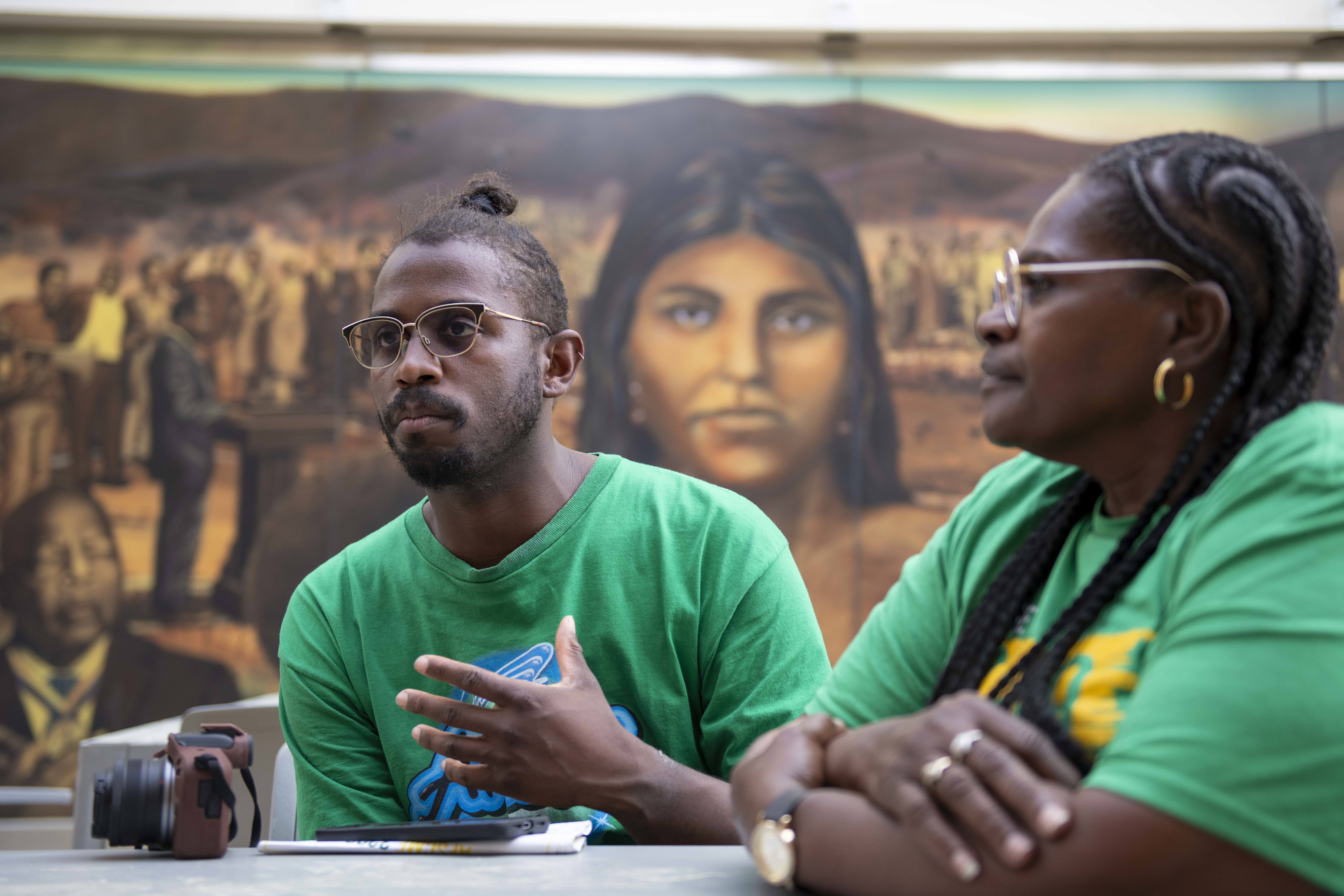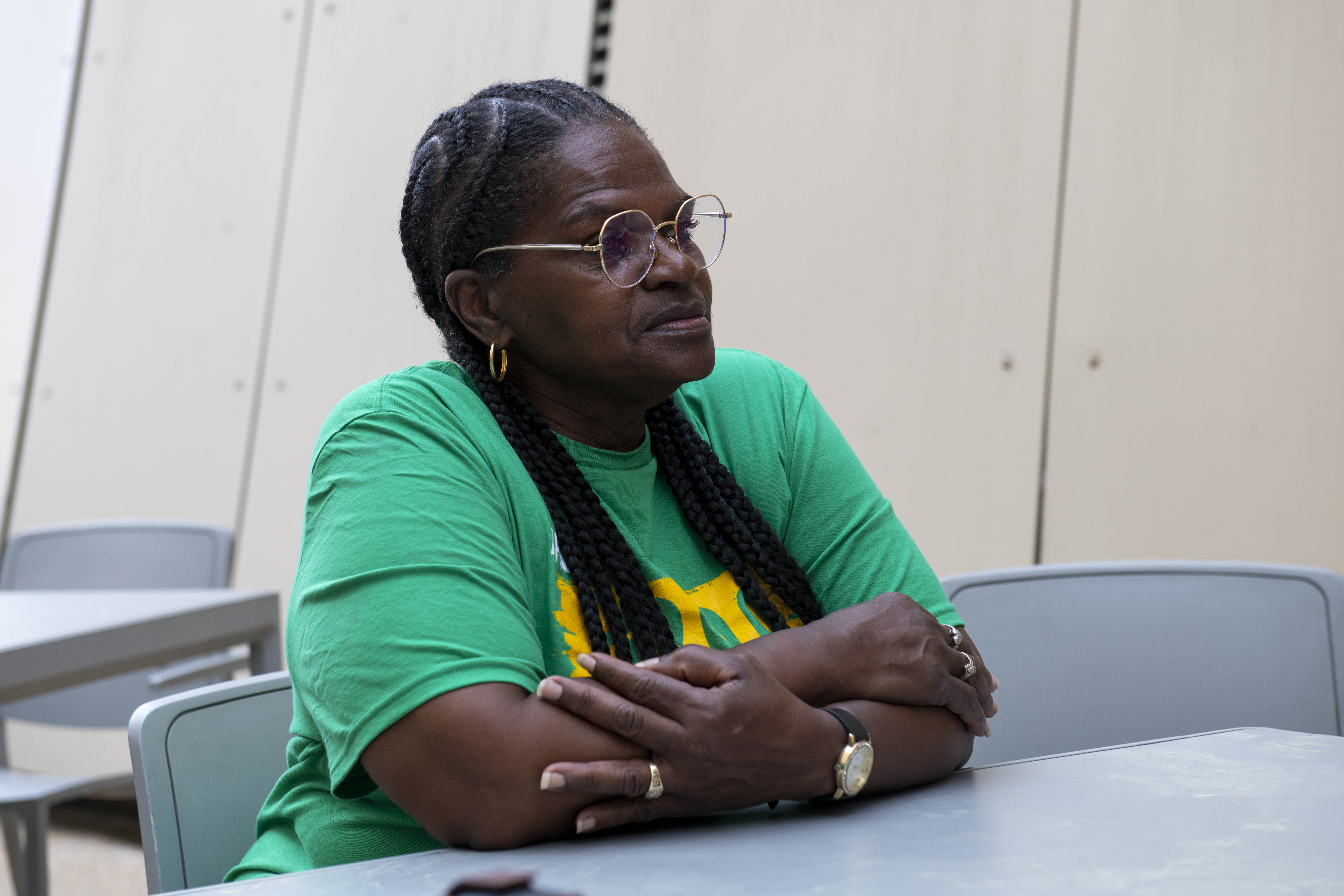Long commutes, short-staffed – ‘We want to live,’ union leaders demand from UC
Jacob Creer (left) and Davina Woods (right) are pictured. The two leaders within the American Federation of State, County and Municipal Employees Local 3299 went on strike last week to ask the UC to raise union members’ wages, claiming that they are facing an affordability crisis. (Anna Dai-Liu/Daily Bruin senior staff)
By Sam Mulick
March 7, 2025 1:35 a.m.
Sitting in traffic makes Jacob Creer nauseous. He can hear the sound of his 2018 Mazda 3 hatchback’s brakes just thinking about it.
So instead of sitting in traffic, Creer – a clinical equipment specialist – leaves his house in Fullerton to arrive by 5 a.m. for a 9 a.m. shift at the Ronald Reagan UCLA Medical Center, taking at least three freeways to get to work. He would rather take a nap in the car before his shift than sit in more than two hours of traffic, he said.

Davina Woods, a senior custodian, said she travels 120 miles every day to and from San Bernardino to get to campus, where she has worked for 14 years, for her 5:30 p.m to 2 a.m. shift. To navigate traffic and potential weather problems, Woods said she leaves her home at 1:30 p.m. to get to campus and also naps in the car before her shift.
Creer and Woods are both leaders within the American Federation of State, County and Municipal Employees Local 3299 – which went on strike last week to ask the UC to raise union members’ wages, claiming that they are facing an affordability crisis.
University Professional and Technical Employees-Communications Workers of America 9119, which represents researchers and technical workers, also called on its members to strike, alleging that the UC refused to bargain in good faith during contract negotiations and implemented restrictive speech policies.
[Related: Thousands of workers from AFSCME 3299 and UPTE-CWA 9119 to strike across UC]
Thousands of union members picketed around campus Feb. 26 to 28, holding speeches and chanting, “Who runs UC? We run UC,” and, “UC, UC, you can’t hide, we can see your greedy side.” As a result of the strike, campus dining halls closed or had long lines of students because of work shortages, and custodial services were limited.
[Related: AFSCME Local 3299, UPTE-CWA 9119 march across UCLA campus, disrupting dining halls]
Creer said he has worked for more than six years in the hospital’s operating rooms, where his duties involve coordinating with doctors to find and obtain specific equipment for clinical trials. Tasked with identifying the most cost-effective equipment for the hospital to buy, he sometimes picks up equipment along his commute, he said.
“I have to go figure out where this piece of equipment is, bring it to that doctor, respond back to the doctor on the trial because they want an update by the end of the day – all of this when I’ve already been in the car for two hours,” Creer said. “After the end of that entire shift – hundreds of emails, things of that nature – I finally get to look forward to another long podcast as I drive back, because it’s rush hour traffic, and I’m stuck.”
On the way home, he often stops in a Denny’s parking lot to take a 20-minute nap so he can stay awake for the rest of the drive, he said. The commute – coupled with frequently working overtime – means he usually gets home around 11 p.m., giving him no time to work out, spend time with friends and family, or take care of Shelly – the pet turtle he’s had since he was 7 years old.
He said he now pays someone to clean Shelly’s tank.
As soon as Woods’ shift starts at 5:30 p.m., she mops, vacuums, sweeps, wipes and removes trash from her designated eight classrooms and four bathrooms in Royce Hall, she said. Because of her work, she has carpal tunnel syndrome from repetitive motion and has had surgeries on her hands and knees, she added.
“Even though that’s my objective – keeping it clean and safe for students, staff and myself – everybody in my department is being stretched to the max because of short staffing,” she said. “When we talk to the UC about that, it’s never addressed.”

Woods said she has to handle a constant flow of people coming in and out of Royce Hall, including people experiencing homelessness. She added that she has to take on the extra role of informally ensuring the building’s security, and she said she also worked during last spring’s Palestine solidarity encampment – which occurred right outside the building’s front doors.
Because of her commute, paying more than $100 every week for gas and missing time with her four kids, Woods went on strike to demand a higher wage from the UC, she said.
“I’m not getting paid adequately enough, even though I’ve been here this long,” she said. “It gets hard. It gets really hard.”
Creer’s unit is also short-staffed in the hospital, he said. This causes him to take on more responsibilities, running equipment from room to room and making repairs in other parts of the eight-floor hospital, he added.
Though the United States has experienced historic inflation since 2021, the UC has not increased wages to reflect inflation, Creer said, which limits workers from living anywhere near UCLA.
While working at the hospital after the COVID-19 pandemic, Creer said he came to a tipping point because of his expenses and exhaustion. He said he searched for other work before being told he would soon qualify for a promotion, which enabled him to keep going.
“They called us heroes. We were watching people literally die and putting our lives at risk,” he said. “And then after the end of that, when the UC had a windfall of money as a result of everything, they again didn’t share any of that with us.”
Todd Stenhouse, a spokesperson for AFSCME Local 3299, said union members have around 10% less purchasing power at the current wage rate, adding that the UC already implemented unilateral increases to health care costs.
Throughout the difficulties, Woods said her colleagues still find the time – mostly during their breaks – to celebrate each other’s birthdays or show support when someone experiences a loss. Recently, they bought flowers for a colleague who lost his mother-in-law and tried to cheer up another colleague whose daughter recently got a divorce, she added.
“We take care of each other because we know each other’s struggles,” she said.
Woods also said her favorite part of interacting with students is meeting people from different backgrounds. When students say hello and greet her by name, it makes her day, she added.
Despite the physical toll of his job, Creer said he still takes immense pride in being a Bruin. He’s most proud of his collaboration with the Lux Lab, part of the UCLA Library system, where he prints 3D models to create items doctors and nurses request – such as if they need an equipment holder or a specific decoration to keep patients calm, he added.
“I’ve just saved the hospital at least $1,000 because things in health care are extremely expensive,” he said.
AFSCME Local 3299 has not reached a contract agreement with the University despite beginning negotiations in January 2024. UC Office of the President Media Relations provided data that the showed staff turnover rate has not exceeded 15% for AFSCME Local 3299 members from 2021 to 2024. In a Feb. 24 post to the social media platform X, UCOP claimed it had offered the union meaningful wage increases and health care premium reductions, and it also alleged that AFSCME Local 3299 has not responded to University proposals since May.
Creer said that every few years, the tipping point looms larger again, and he considers abandoning his years of experience and skill to work somewhere closer to his house and decrease the stress of travel. However, Woods said as she turns 65 years old this year, she does not want to go somewhere else and start at the bottom before retiring. UCLA, her home for 14 years, is her last stop, she said.
“We’re tired of surviving,” she said. “We want to live.”
